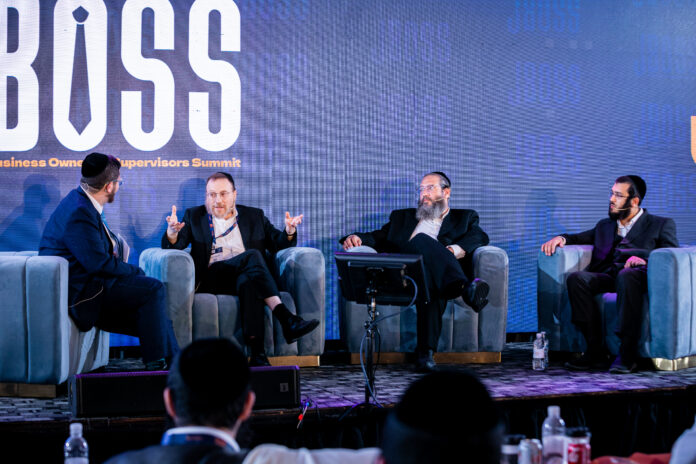I recently had the opportunity to host a unique panel with three insightful and successful entrepreneurs. Our conversation took place at the JBoss Summit arranged by Shmiel Stern, and was attended by over 500 people looking for insight into how to grow their business.
Each panelist brought a unique perspective to the stage.
Chaim Piekarski, the CEO of C+A Global, is a well-respected entrepreneur who runs several successful online and Amazon businesses. He manufactures his own products and is a sought-out source of advice.
Chaim Hersh Goldberger is the CEO of Tiger Companies and oversees several other successful ecommerce ventures. He is a mentor to many businessmen who turn to him for guidance.
Yanky (Jacob) Guttman is the CEO and founder of Nail-It Handyman, a service company operating in five states with numerous employees.
I moderated the panel based on questions sent in by the attendees in advance. The conversation was spirited and entertaining, a feeling I tried to capture on paper. Although what follows is only a sampling of what was covered, I believe it contains implementable, tangible advice including on how to hire and fire, maintain company morale, and how to get through a bad day. Enjoy!
—Nesanel
Nesanel Gantz: Let’s give a big welcome to Chaim Piekarski, CEO of C+A Global, Chaim Hersh Goldberger, CEO of Tiger Companies, and Yanky Guttman, founder and CEO of Nail-It Handyman.
Yanky, tell us about your background and how you got to where you are.
Yanky Guttman: Almost seven years ago, while working in construction, I recognized a specific niche and opportunity in an underserved market: handyman services.
Today, we are in Florida, Connecticut, Pennsylvania and New Jersey. We also have a dozen trucks that travel across America.
Nesanel: Let’s be a little more specific. How did you build the business?
Yanky Guttman: My first step was writing a business plan. I was still working as a contractor, but I started drafting my plan on paper, both the budget and the operations. I pitched it to an investor, secured funding and started the business. Then I put the word out and did the hiring.
Nesanel: Chaim, you’re next. What’s your background?
Chaim Piekarski: Thirty years ago, I sold film on the gray market, meaning that we bought from different markets in different currencies and then brought the product to the US to be sold inexpensively. I did this for many years, eventually graduating from film to cameras. This was back when digital photography was first starting and I was very successful. That is, until I was put out of business by circumstances outside the actual business that were beyond my control.
At around age 35, I was technically bankrupt. I went to work for somebody, and about a year later I met up with my former competitor, Akiva Hesh Klein. We teamed up and started selling cameras again. This was around 20 years ago. At first, we sold on eBay, and when Amazon started, we sold there as well.
We began with closeouts. At that time anything you listed sold quickly. Amazon was growing so fast that we were able to sell unrelated products. We were selling garment steamers and battery chargers; the consumer didn’t care if we had a full category or not. From there, we transitioned to other platforms and into retail stores. Today, we have several different businesses in a couple of states, some of which sell online. We have around 350 employees.
Nesanel: And you manufacture some of the products you sell?
Chaim Piekarski: Yes. We have a couple of factories. Most of our products are made overseas and imported.
To read more, subscribe to Ami





















